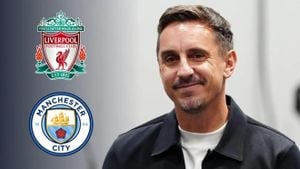Across Europe, anti-immigrant sentiment is colliding sharply with rising violence, particularly within the soccer fan community. Recently, tensions erupted in Amsterdam during and after a match between Ajax Amsterdam and the Israeli team Maccabi Tel Aviv, where the aftermath sparked discussions around antisemitism and violence perpetrated against fans.
The clash saw supporters of both teams partake in violent outbursts, with reports indicating some Maccabi fans engaged in aggressive actions, targeting people they believed were Arab. Witness accounts captured scenes of dozens of these fans vandalizing property and engaging in physical confrontations. This mayhem left five individuals needing hospital treatment for injuries sustained during the disorder.
The European Jewish Association voiced extreme concern, stating such incidents reflect rising antisemitism across the continent. "What happened is shocking and unimaginable. We demand immediate action from the authorities to prevent this from recurring," remarked the organization’s representative. This call for action is underscored by broader societal anxieties, especially following the conflict between Israel and Hamas, which has seen protests globally, often leading to spikes in antisemitic incidents.
Meanwhile, Dutch politicians are offering their opinions, with Geert Wilders—leader of the far-right Party for Freedom—directly blaming Moroccan immigrants for the violence. Wilders suggested deporting those with dual nationality who are convicted of assaults against Israeli fans. He claimed, “We saw Muslims hunting Jews on the streets of Amsterdam,” during heated parliamentary debates. His remarks have stirred significant controversy. Critics argue such incendiary statements only fuel division and do little to heal existing societal rifts.
Opposition lawmakers, including members from the D66 party and other centrist factions, pushed back against Wilders' rhetoric, stating his statements only add fuel to the fires of division rather than promote unity and healing. “We must work together against antisemitism and violence, not make it worse through inflammatory language,” said Rob Jetten, emphasizing the need for leaders to transcend political gains for communal harmony.
These incidents aren't isolated but are indicators of a growing sentiment throughout Europe. Hate speech and violent anti-Asian incidents—like those directed at other marginalized groups—have also seen increases, sparking fears of broader societal issues being overlooked. Many activists advocate for measures to increase monitoring of hate crimes and enhanced protections for minority communities.
This surge of antisemitic acts is alarming, set against the backdrop of recent global conflicts. The current climate has seen Jewish individuals feeling increasingly vulnerable, as the larger geopolitical issues concerning Israel and Palestine bleed over onto local landscapes.
Back to Amsterdam's recent chaos: City Mayor Femke Halsema condemned the disorder, clarifying it has tarnished Amsterdam's legacy as a refuge for multiculturalism and tolerance. “This is tragic for our city’s identity, which we cherish,” she remarked after the violent incidents raised discussions at local town halls. Amidst these calls for peace and healing, there lies the troubling undertone of communal fear and insecurity.
Beyond the immediate confrontations at sporting events, the sociopolitical fabric of nations like the Netherlands is being tested. Urban centers, long seen as hubs for diversity, now witness growing anxiety as local communities grapple with integration challenges and political rhetoric intertwining with violence.
The rising xenophobia and violence against fans could spell long-term cultural ramifications if not addressed holistically. Amsterdam has introduced stricter regulations governing public gatherings, attempting to quell the unrest seen during protests and fan events alike, but skepticism among residents remains high.
There are multiple layers to the current political climate pushing people to seek unity. Some Dutch nationals question how new laws and policing policies can assuage tensions and whether they'll merely channel the anger elsewhere without targeting the root causes of disenfranchisement and violence.
Soccer games regularly serve as microcosms of broader societal issues, where sportsmanship is too often drowned out by underlying prejudice and hatred. Advocates argue soccer organizations and their fans need to create more spaces for dialogue, healing, and community-building outside the pitch to counteract negativity entrenched within fan culture.
With the echoes of violence still reverberant and the specter of antisemitism looming, Europe finds itself at a crossroad. Anti-immigrant narratives may resonate with some legislative leaders like Wilders, but they also risk fragmenting societies already on edge. It becomes imperative to approach the healing process with empathy and foresight, lest the unfortunate incidents of violence and rhetoric spread beyond soccer stadiums, threatening the cohesion of European societies entirely.
The need for unity, increased psychological awareness, and proactive strategies to mitigate hate crimes has never been more urgent. The path toward healing requires committed action from all levels of society—from government to grassroots movements—to reaffirm the values of tolerance and mutual respect. Without such efforts, Europe’s rich diversity could dissolve under the weight of division and hostility.



